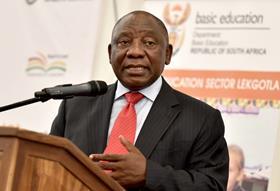
For almost a year now, the South African citrus industry has been impatiently waiting for the US to publish a new rule which would grant further access for their fruit to the American market.
It is commonly accepted that the trade war between the US and China is responsible for this document being shifted to the bottom of the pile of papers waiting to be signed in Washington.
Although South Africa is not part of the war between the two superpowers, obtaining further access is seen as vital for the South African citrus industry in its efforts to successfully market its fast increasing production in future.
What has appeared like South African neutrality on the matter may now be changing, with reports on Friday that president Cyril Ramaphosa has come out in support of the Chinese tech giant Huawei.
The step is viewed with much concern, so much so that the influential South African Sunday Times used its leader column to caution the president about his action.
Ramaphosa's statements came a week after the ban on Huawei in the US was suspended. However, before this the South African cell phone companies lobbied the president about a possible loss of R100bn in infrastructure investment as a result of the trade war.
What is of concern is that Ramaphosa used a major address to accuse the Americans of 'jealousy' because they are falling behind in the race to develop the next generation of software.
What will be of concern for the South African citrus sector is that the US may well punish South Africa for its stance on Hauwei. At stake is South Africa’s participation in the AGOA agreement, which gives African produce duty free access to the US.
At present South Africa exports around 50,000 pallets of citrus to the US annually. The expanded access will mean that more areas of the country will be able to ship to the US and benefit from AGOA.
The South African media, in particular the Sunday Times, called on the Ramaphosa to make sure he keeps all doors to trade open.
“Goading the US to please China hardly seems the way for South Africa to grow its trade with the world,” the publication concluded.



